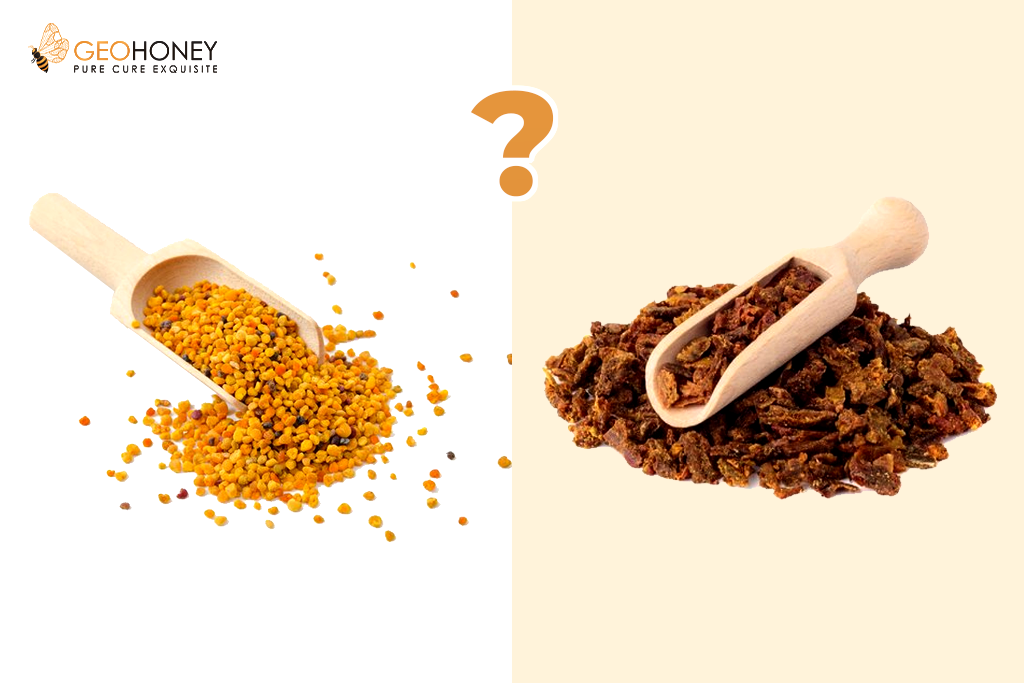- Tokyo: 18:07
- Singapore: 17:07
- Dubai: 13:07
- London: 09:07
- New York: 04:07
Bee Pollen And Propolis – What Is The Difference?

Bees are the most significant pollinators of the environment. While thinking about the products made by these vital creatures, honey is the first thing that comes to mind. However, natural honey isn't all that honey bees produce! Truth be told, there are a lot of other bee products that are made when it comes to bees and harvesting honey.
The entire process of bee pollination assists with keeping up with the biological environment of nature by pollinating blossoms and helping new plants reproduce. Thus, this process influences the wide range of various plants, animals, and even people, permitting us to flourish.
Many other bee products like honey, propolis, bee pollen, royal jelly, and beeswax are delivered during pollination. These items have been utilized as a natural food source and for medicinal purposes for healing. So it isn't a surprise that they have become popular health supplements and products for the people who get their substantial impacts. In this blog today, we will mainly discuss the differences between bee pollen and propolis.
What is Bee Pollen?
Honey bees are covered in pollen when they gather nectar from plants and these chunks of pollen get deposited into honeycomb cells alongside hormones and antibiotic substances from the honey bees. It is utilized as a wellspring of nourishment for the young honey bees in the bee colony.
Bee pollen tastes slightly bittersweet, floral, and powdery, and you can add it to your yogurt, cereal, and oats as a topping. It is a supplement loaded with eighteen nutrients, essential amino acids, and compounds and is a rich wellspring of protein. Bee pollen granules are considered nature's complete food and are filled with protein.
What is Propolis?
On the other hand, propolis is a type of honey bee resin or glue that honey bees produce to seal and safeguard the hive from intruders and microbes. It is used to seal openings and cracks and the construction of the colony of bees. It is additionally utilized for keeping up with the hive's interior temperature at about 35 degrees Celsius and leveling the inner surface of the hive. When propolis solidifies the cell wall, it establishes an aseptic climate that keeps the colony of bees shielded from pollution brought about by dangerous microscopic organisms, viruses, or other bacteria.
Propolis is known for its strong antibiotic properties and can be added to well-being products like toothpaste or consumed directly in the form of capsules or liquid extracts. It contains over 300 compounds, primarily consisting of polyphenols and flavonoids.
Differences between Bee Pollen & Propolis –
Bee pollen and propolis are derived from bees and are often marketed as traditional medicines. While both come from hives, they are created and utilized in various ways by honey bees. Insistences about their impacts on human wellbeing are dubious, and research on their viability is conflicting.
Bee pollen and propolis have undeniable advantages for an irritated throat and cough. The first produces, to a greater degree, a balsamic capacity, and the subsequent one is more antibacterial, guaranteeing that it doesn't go any further. In the respiratory tract, it is a natural and anti-flu antibiotic for its anti-inflammatory and sedative activity. While bee pollen is best taken in the morning, the propolis can be taken any time of the day and a few times if required.
Potential Benefits of Bee Pollen –
(1) Works as an antioxidant
(2) Reduces stress
(3) Speed up the healing process
(4) Improves liver health
(5) Boosts the immune system
(6) Eases premenstrual & menopausal symptoms
(7) Reduces seasonal allergies
Potential Benefits of Propolis –
(1) Manages diabetes
(2) Relieves gastrointestinal disorders
(3) Treats cuts and burns
(4) Minimizes oral swellings and sores
(5) Combats herpes
While more fundamental or human-based research is still required, there's solid proof to propose that honey bee products - including honey bee pollen and propolis - could offer individuals all medical advantages. But, unfortunately, people don't have similar dietary necessities as honey bees. There also is the worry of possible allergic reactions, which can be extremely serious in particular people who take honey bee products.
It's generally wise to consult your primary care physician about beginning new supplements. They can assist you with deciding if you should be worried about aftereffects, sensitivities, and interactions with medications. Also, make sure to use supplements bought from genuine suppliers such as Geohoney.
Honey bees genuinely are amazing creatures. It is truly remarkable how their products give so many medical advantages to people. In any case, the nature of honey bee products relies upon the climate and strength of the hive. In a perfect world, honey bees approach all they need to keep up with their hive. And as they are already under stress, we don't have to add more to their plates. Thank the honey bees for their business - it serves us all well!




Bee pollen and propolis are both different. Both have many benefits. Bee Pollen is mainly used as an antioxidant, while propolis is mainly used for managing diabetes.